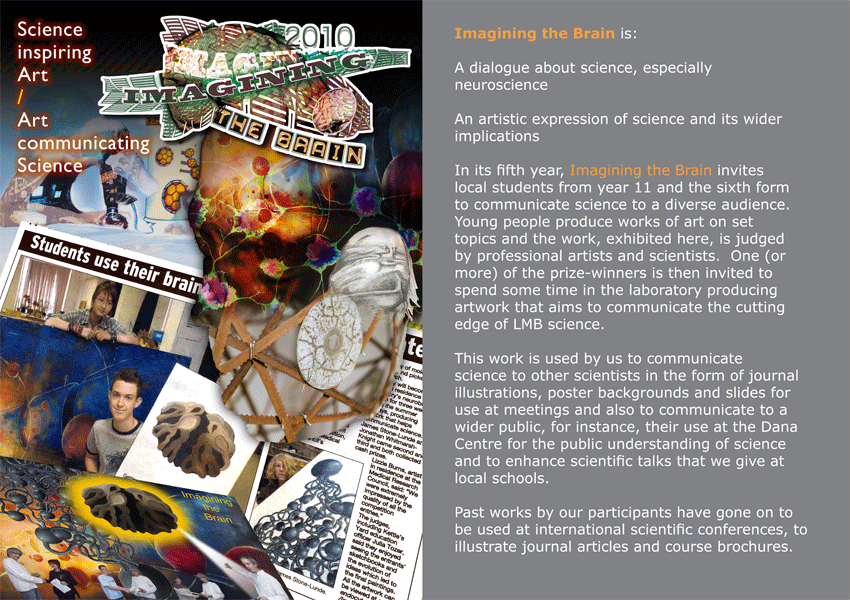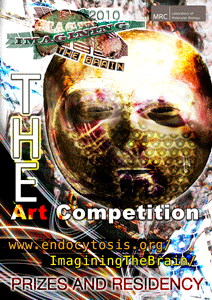Deadline for entries:
30 June 2010
Topics for 2010: Diversity and Disorder The (St)ages of the Brain 
|
Open to students aged between 15 and 19 on 1Aug2010
This competition is open to all students interested in both art and science in the Cambridge area. We are looking for people who are inspired by science, can see science from a different point of view, can challenge existing perceptions and can communicate complex scientific ideas visually and in writing. |
|
Fill in the application form (here). The organisers would be delighted to talk with you about your project. Fill in the comments and questions section of the application form and we will get back to you or email: ITB(at)mrc-lmb.cam.ac.uk "I have found my residency at the MRC a really awe-inspiring experience. It has been an honour to be allowed into the lab and have the various projects explained to me and I feel so lucky to have been involved in the initiative. The ‘Imagining The Brain’ competition is a rare and very valuable opportunity for young people to explore their interests in both art and science, which I think is fantastic. The project has encouraged me to explore areas of enquiry in my art that I would not have previously considered and due to this I have found the process hugely stimulating and interesting. It is not often that someone of my age can have access to what is going on at the very forefront of science, and I cannot thank everybody at the MRC enough for being so kind in showing me their work and encouraging me with my art work." Lucinda Dawkins, Cambridge
Report from Head of Art, Netherhall Sixth Form Centre
"We have taken part in Imagining the brain since 2006. The talks are so exciting and cutting edge science is presented in clear language in a way we can all understand. The aim of the topics is to ask questions that are important to both artists and scientists: Who are we? What happens when our brains don’t work properly? How does life work?
My students get a lot out of the project. They love the exhibition and it is really exciting after concentrating on the curriculum to have this artistic space where they can freely explore something completely different. Yvonne’s enthusiasm for science and her ability to talk about very complex subjects in an easy and understandable way has opened a lot of doors for students and staff here.
Report from Head of Art, Impington Village College
"Imagining the Brain is a brilliant initiative. Yvonne comes to the Sixth Form annually and gives talks structured around the requirement of the Theory of Knowledge component of the International Baccalaureate. The talks are gripping, for both staff and students and encourage all of us to think in new directions. The exhibitions have been very good for Impington students, allowing several pupils to really achieve their potential as serious artists. Understanding a bit more about the nuts and bolts of how their brains work engages even the students who had decided that science wasn’t for them. As an art teacher, I am impressed with the way that that my pupils are inspired by the science topics. I hope Imagining the Brain continues long into the future.
The competition will be externally judged by distinguished artists and scientists. Normally, three winners will be chosen and cash prizes will be awarded; £100 for first place, £75 for second place and £50 for third place. You will be asked to attend a prize giving ceremony at the MRC and we will retain the artwork of the winning entries. If your art is also part of the requirements for your GCSE, AS, A level or IB course, you will have it returned to your school or college for marking. We will interview the winners and select people for the summer placements. These funded placements will be in a science laboratory, interacting with scientists and generating artwork to communicate science, and will last for 3-4 weeks each. The artwork could be used to explain ideas at international conferences, public understanding of science events, journal covers or book illustrations; there are many possibilities. We will retain the copyright on any images you produce during your placement but you will always be credited for your work.
Placement
We will select students from among the winners of the art competition to spend between 3 and 4 weeks in the lab over the summer. There are two types of placements: Artist in residence: You will spend the first couple of days talking to people in the lab about the different projects they are working on. We will then meet to discuss ideas and see which projects are good to follow up on. The artwork is generally done at home. You will produce concept pieces & then we meet again to discuss how the ideas are evolving and to fine tune the science. You take the projects to completion. Digital artist/animation specialist : we envisage this placement working in much the same way as the artist in residence placement, although there is more scope to do some of the graphics work at a desk in the lab, if you wish. Here is a link for a digital art representation of what happens in cells (link). This link shows very useful animations of what happens in cells and although we do not seek this level of quality we would love to see to see how students think animation/graphics can be used to communicate complex details in science. It is clear that in the future these types of representations will be increasingly used to communicate how we function at a molecular level. We are grateful to the MRC and the MRC, Laboratory of Molecular Biology for their generous sponsorship of this project. |
Back to 'Imagining The Brain' Home Page
Background to project
Back to McMahon Home Page

